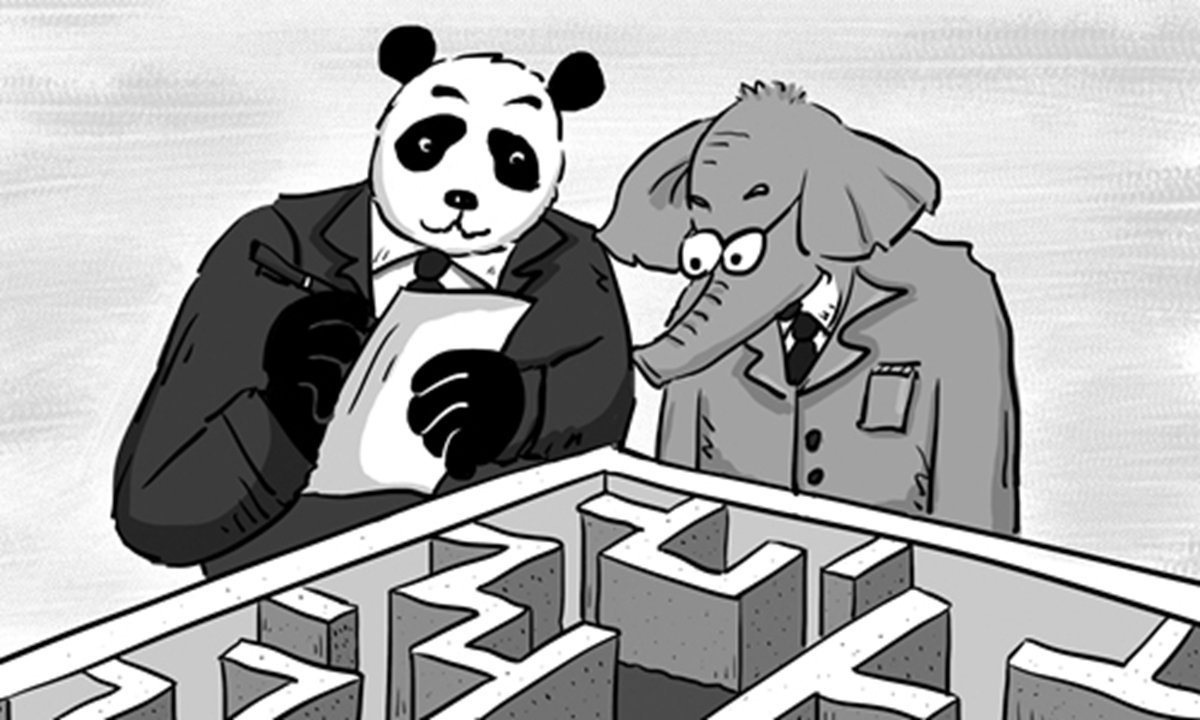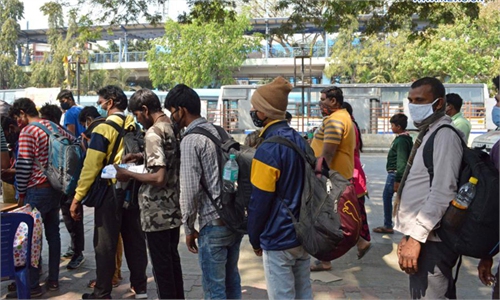
Illustration: Chen Xia/GT
On February 10, Chinese and Indian troops have started simultaneous and planned disengagement in the Pangong Lake area.On Wednesday, Indian Foreign Secretary Harsh Vardhan Shringla said, "We do believe that in the next two or three days this process would have come to a conclusion." The withdrawal of the troops has at least ended the military confrontation between the two countries that have gripped them since the summer of 2020. In doing so, it has created preconditions for the future restoration of peace and stability in the China-India border area. This is a positive sign that the bilateral relationship may relax.
The disengagement agreement is a wise and pragmatic decision made by Indian Prime Minister Narendra Modi's administration after weighing the country's interests at both home and abroad. Some Indian politicians and strategists, including Shringla, believe the move fits India's national interests. Shringla said on Wednesday that the disengagement plan is a "step in the right direction." Indian Defence Minister Rajnath Singh also noted on Thursday that, "It is expected that this will restore the situation to before the standoff of last year."
The border confrontation has severely disturbed previous peace and tranquility on border areas, and jeopardized their mutual strategic trust. Economic, trade and people exchanges have been greatly affected. When it comes to economy and trade, the Indian side has unreasonably set restrictions on Chinese investment as a form of revenge. Such a revengeful mentality has long existed in Indian government and society.
Contrary to New Delhi's expectations, the economic retaliation against Beijing has not been very effective. In fact, India took advantage of conflicts with China to artificially reduce economic ties and promote its initiative of Make in India. However, India's imports from China increased rather than decreased in the second half of 2020 following the China-India border skirmish in May.
Moreover, China has emerged as India's biggest trade partner in the first half of financial year 2020-21, overtaking the United States. On the one hand, this shows that the economic complementarity between Beijing and New Delhi is not a matter of political considerations. On the other hand, India has to lower its anticipations to strengthen economic and trade ties with the West due to the ravaging COVID-19 pandemic.
As Reuters reported on Tuesday, India is ready to clear some new investment proposals from China in the coming weeks. This is actually the result of India's profound reflections. India has realized that setting limits on investment from China at this stage is not good for the China-India relations. Nor does it serve the interests of India itself. In 2020, under the influence of the pandemic, India witnessed a 23.9 percent fall in GDP in the first quarter of financial year 2020-21, the lowest in 24 years. In this case, the unjustified suppression of Chinese investment against the natural laws of the economy through political factors can be considered harmful to the recovery of India's economy. So it is in India's own interest to lift the ban on Chinese investment. After all, the biggest obstacle in China-India relations last year was an accident and harmful to both.
However, this does not mean that India has completely put down its guard against China. According to Reuters, India will only clear new investment proposals, "which are not sensitive to national security." This shows that New Delhi still has a lot of vigilance against Beijing in the security field and there are still many obstacles in the process of easing China-India relations. The China-India border confrontation has not only damaged the strategic mutual trust between the two countries, but also seriously undermined the foundation of India's public opinion toward China. This has also led to New Delhi's top-down vigilance against Beijing. Although frontline troops from both Chinese and Indian armies have started to disengage, India's vigilance will continue for a while. The two sides still need a long time to bridge the gap.
It should also be recalled that the US plays an important external factor in the development of China-India relations. But New Delhi is still cautious on whether to choose Beijing or Washington. This is because there are still many uncertain factors among the three countries. For example, although US President Joe Biden wants to strengthen cooperation with India through mechanisms such as the Quadrilateral Security Dialogue (Quad), India itself has the pursuit of becoming a major power. New Delhi will not blindly follow Washington's will on some major international issues. Overall, China-India relations have shown signs of easing. Although India-US relations are improving, India will still want to maintain some strategic flexibility before the Biden administration releases its specific India policy. India does not want to be restrained by the Quad too soon. Therefore, China-India relations intrinsically depend on the two countries themselves.
The author is director of the research department at the National Strategy Institute at Tsinghua University. opinion@globaltimes.com.cn



